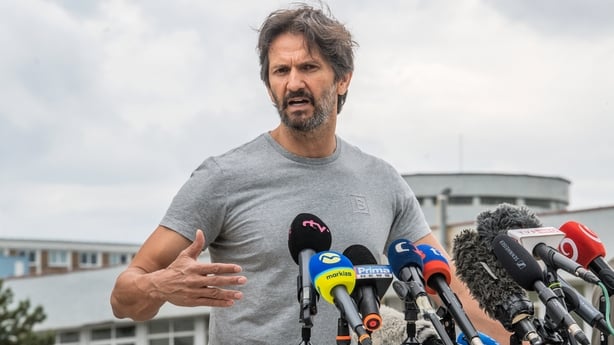Slovak Prime Minister Robert Fico's life is no longer in danger following an assassination attempt, Deputy Prime Minister Robert Kalinak has said.
Mr Fico has been in hospital since Wednesday when a lone gunman shot him four times, including in the abdomen.
"He has emerged from the immediate threat to his life, but his condition remains serious and he requires intensive care," Mr Kalinak, Mr Fico's closest political ally, told reporters.
The Slovak premier underwent a five-hour surgery on Wednesday and another surgery on Friday, both at a hospital in the central city of Banska Bystrica.
"We can consider his condition stable with a positive prognosis," Mr Kalinak said outside the hospital, adding, "We all feel a bit more relaxed now."
Mr Kalinak added that Mr Fico would stay at Banska Bystrica for the moment.

The suspected gunman, identified by Slovak media as 71-year-old poet Juraj Cintula, has been charged with attempted premeditated murder and was put in pre-trial detention by a special penal court yesterday.
Mr Fico was shot as he was walking to greet supporters after a government meeting in the central mining town of Handlova.
Mr Kalinak said earlier that Mr Fico had suffered four gunshot wounds, two light, one medium and one serious.
Read More:
Robert Fico and the rise of political violence in Europe
What does the Fico shooting mean for Slovak politics?
Interior Minister Matus Sutaj Estok said that if one of the shots "went just a few centimetres higher, it would have hit the prime minister's liver".
Mr Fico, 59, took office in October after his centrist populist Smer party won a general election.
He is serving his fourth term as prime minister after campaigning on proposals for peace between Russia and Slovakia's neighbour Ukraine, and to halt military aid to Kyiv, which his government has done.
Mr Kalinak said the government would carry on without Mr Fico "according to the programme he has outlined", including two meetings next week.
The assassination attempt has deeply shocked the EU and NATO member country of 5.4 million people, already sharply divided over politics for years.

